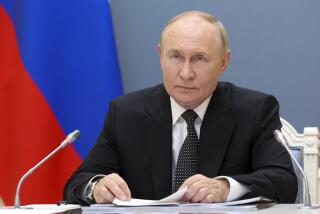Free, but How Free?
- Share via
The Soviet Union’s two best-known human-rights activists--Nobel Peace Prize laureate Andrei Sakharov and his wife, Yelena Bonner--have been released from their internal exile in Gorky and allowed to return to Moscow--he free to resume his work in physics, she pardoned from her conviction for alleged anti-Soviet slander. What conditions attach to the return of these outspoken critics of repressive Soviet policies isn’t known. Even under Mikhail S. Gorbachev’s proclaimed policy of glasnost , or openness, it seems highly unlikely that the Sakharovs will be left free to meet with whomever they choose or to express their thoughts as conscience may require.
Still, on the same day that the return of the Sakharovs was announced--significantly, by the externally oriented foreign ministry--the Communist Party organ Pravda published a sweeping attack on the governing style of the late Leonid I. Brezhnev, under whom the Sakharovs were punished and exiled. The timing, in the familiar locution of Soviet propaganda, could not have been an accident.
It is probably no accident, either, that the Sakharovs’ release came only days after the death in prison of Anatoly Marchenko, another noted and courageous human-rights activist. Marchenko died young, after spending 20 of his 48 years in jail, in harsh labor camps or in exile. Frequently duringthose times, including shortly before his death, he went on hunger strikes to protest the habitual mistreatment of political prisoners. Frequently he was subjected to brutal physical and psychological abuse in an effort to crush his iron will. The Sakharovs are both known to be in poor health. In Moscow they will have access to better medical treatment. Marchenko’s death reminded the world of what Soviet punishment of dissidents can achieve. Gorbachev and his colleagues may simply have decided that one reminder was enough.
The release of the Sakharovs mitigates a shameful injustice. It does not of itself, or even in conjunction with Pravda’s attack on Brezhnev for his intolerance of criticism, herald the dawn of a new era in Soviet internal policies. That will only come when Soviet policy on human rights undergoes a drastic and fundamental transformation. Permitting the Sakharovs to end their internal exile is a welcome move, certainly, even if it was prompted by nothing other than self-serving political considerations. At best it simply puts things back to where they were in 1980, under Brezhnev, before Sakharov was banished. The real test is whether Gorbachev will in fact go beyond the Brezhnev era and the Khrushchev era and the Stalin era and allow Russians the rights that the Sakharovs have suffered for and that the Marchenkos and so many others have died for.
More to Read
Sign up for Essential California
The most important California stories and recommendations in your inbox every morning.
You may occasionally receive promotional content from the Los Angeles Times.













